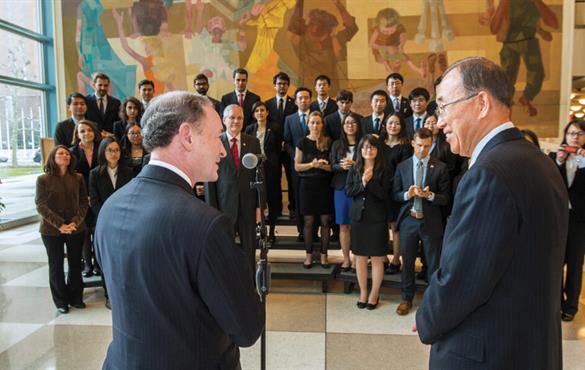Going global
From the beginning of his tenure, Mark Wrighton set out to put Washington University and its students and faculty on the map

In 1995, when Chancellor Mark S. Wrighton gave his inaugural address as the 14th chancellor of Washington University, one of his key themes was making the university a global leader.
“Washington University will remain among the leading educational institutions only if we are preparing our students to live and work in an increasingly internationalized world,” he said. He had a vision of developing “strategic relationships with institutions in other countries,” particularly in Asia, and he emphasized the importance of bringing the world to Washington University by attracting the best international students and scholars.
Ten years later in 2005, Chancellor Wrighton, along with former Sen. John C. Danforth and Life Trustee John F. McDonnell, DSc ’06, MBA ’14, former chairman of the board of McDonnell Douglas Corp., were together in the Overseas Press Club in New York City to announce the university’s new global initiative, the McDonnell International Scholars Academy.
The academy would build partnerships with leading international universities, and through these, Washington University would attract top-flight international scholars to a program designed to make them world leaders. The partnerships would also broaden the scope, reach and collaborative potential of the university’s research.
“This initiative … is one of the most farsighted undertakings I have seen,” John F. McDonnell said at the announcement. “It integrates the internationalization of research and education with the ascent of Washington University among the world’s leading universities.”
“Most academic connections are developed along the lines of narrowly defined intellectual interests,” said James V. Wertsch, the David R. Francis Distinguished Professor, who served as founding director of the McDonnell International Scholars Academy and as vice chancellor for international relations before stepping down in 2018. “In contrast, the McDonnell Academy brings together a ready-made network of universities and top minds from many areas to talk about world problems. Just as technology has become globalized, so have our challenges.”
When it started, the academy had 15 partner universities all in Asia. Now it boasts 34 partner institutions around the globe.
In May 2007, the McDonnell International Scholars Academy held its first international symposium, which gathered leading scholars from partner institutions to discuss issues regarding energy and the environment. The academy continues to host symposia biennially, and it has broadened the number of topics discussed over time. At the most recent symposium in Beijing in 2018, topics included population aging, air pollution, energy, the environment, agriculture and climate change. Developing more sustainable campuses was also a key topic. While there, 21 member institutions signed the University Campus Sustainability Declaration, pledging to reduce their carbon footprints.
The world has come to Washington University as well. When Wrighton made his inaugural address, the student body represented 45 nations. Today, that number has more than doubled, and international students represent 19 percent of the university’s enrollment.
Looking to the future, Washington University is committed to deepening its engagement in Africa. To lead this endeavor, the university hired Benjamin Ola Akande as senior adviser to the chancellor and director of a new Africa initiative.
“The vexing problems and challenges we face are ones that are multidisciplinary in character,” Wrighton said in his first address, “requiring concerted, synergistic effort from many intellectual perspectives. Some areas of contribution will involve improving human health, sustaining the environment, developing economic strength, fostering world peace and enhancing the quality of life. No important problem is too complex or too difficult to tackle … Our work awaits us. Let us begin.”
His commitment inspired faculty and researchers across Washington University to think and act more globally, reshaping the way people live around the world. Below are just a few of the university’s many global projects. To see more go to global.wustl.edu. To see the projects on a map go to GlobalMap.
South Asia
Clearing the air
In India and other energy-impoverished regions, people still use solid fuels (wood, charcoal, crop waste) to cook their food, which can release dense, black smoke into the home. Pratim Biswas, assistant vice chancellor of international programs and the Lucy and Stanley Lopata Professor in the McKelvey School of Engineering, and Rajan Chakrabarty, assistant professor of engineering, went to rural parts of India to study the impact of cook-stove emissions. “Traditional cook-stove burning is one of the largest sources of pollutants in India,” Chakrabarty says. “We found it’s a really big problem, revising what people knew for decades.”


